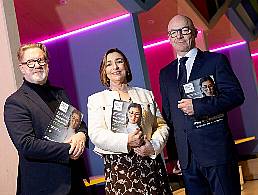Business leaders will need to foster a people-centric culture of innovation as remote working looks set to stay, says Microsoft.
The findings of a recent Microsoft survey suggest that while business leaders and employees both believe flexible working is here to stay, better ways of innovating are needed. The survey was developed with Boston Consulting Group and KRC Research and asked 500 employees and 108 business leaders across Ireland about their experiences of remote working and their predictions for the future of work.
Of the leaders who took part, 45pc said they believe their employees will continue to work remotely. Just 22pc of the companies had set remote working policies in 2019. That figure has climbed to 72pc this year.
At 97pc, almost every business leader who took part in the survey said that changing how their company works is a priority at the moment. This was reflected in employees’ responses, many of which recognised some value in working in an office some of the time but, for the most part, showed an appetite for greater flexibility.
Microsoft report findings
Many employees said they’d prefer to spend around one-third of their time at work outside a traditional office setting. They said that continuing to work in a main office some of the time was important for socialising and “maintaining bonds” with colleagues.
However, they also identified a number of benefits of working from home, including the casual dress code (79pc), having more time for hobbies (56pc), having a personalised workspace (46pc) and getting to keep their pet by their side (32pc).
In terms of productivity and retaining staff, 73pc of the leaders said their teams’ productivity had either stayed the same or increased while working from home. More than two-thirds (68pc) said that introducing more flexible policies is a “powerful way” to hold on to staff. Almost two-thirds also said that sustainability is one of the key reasons they plan to introduce flexible working.
Businesses are finding it more challenging to innovate, however, partly because of “increased silos”. According to Microsoft, this is an issue because innovation lends itself to a happy workforce. While leaders in Ireland said their companies’ innovation levels remained unchanged from last year, those based across Europe reported an average drop from 56pc to 40pc.
The findings also showed that, of employees working in innovative companies, employees were more likely to be productive when remote working than those based in less innovative organisations.
Those employees also identified feeling more empowered to make decisions, reassured that it’s OK to make mistakes, better able to collaborate and focus, and that the work they do has purpose.
Overall, 69pc of participants working at innovative companies reported feeling happy at work, compared to 39pc of those working at less innovative firms.
‘The human key to innovation’
Some of the biggest challenges leaders are facing as their teams work remotely included not being able to delegate in or empower virtual teams (58pc) and not being able to unify their teams (56pc).
Commenting on the findings in a company blog post, Microsoft commercial director, Aisling Curtis, said: “The key takeaway is that the success of teamwork in a more hybrid world goes beyond just having the right technology tools.
“Innovation is fuelled when people feel empowered to connect with colleagues, take smart risks and speak up when they have new ideas. So, the challenge for businesses will be ensuring people feel connected to their teammates and to clearly see how the work they do as a team contributes to realising the vision of the company.
“Successful teams will be characterised by how productive they are as well as the sense of camaraderie, empathy and trust each team member feels. This is the very human key to innovation.”




